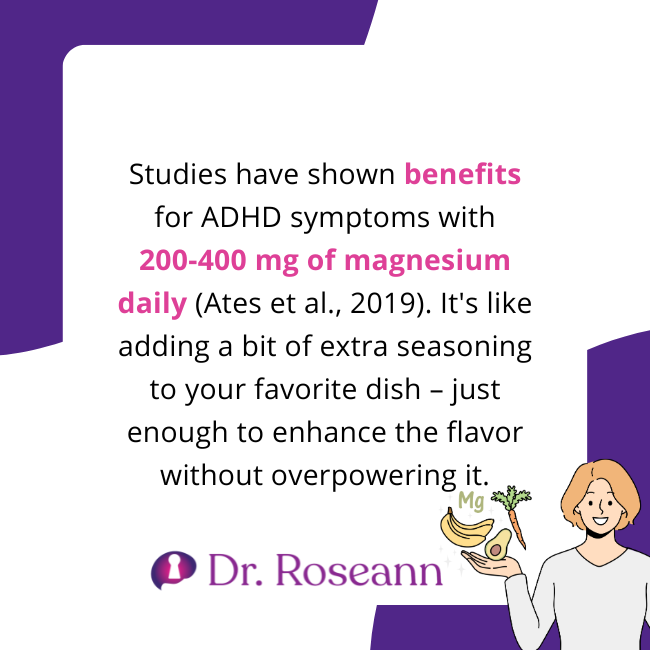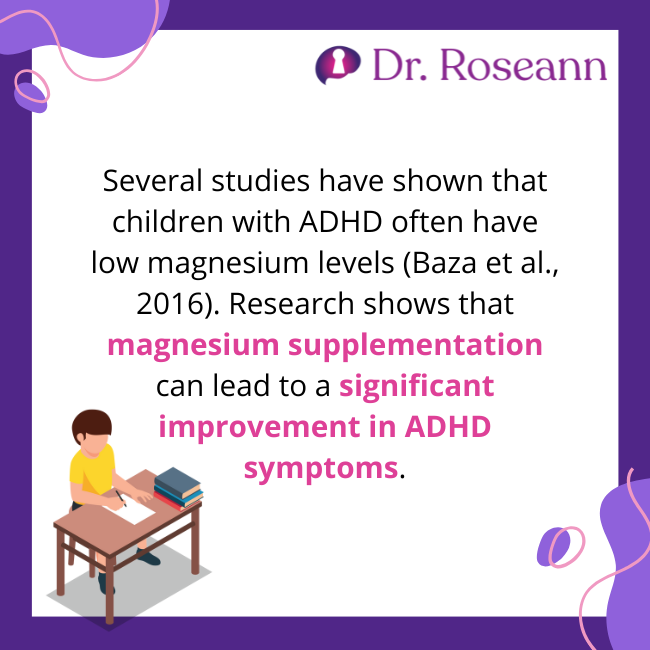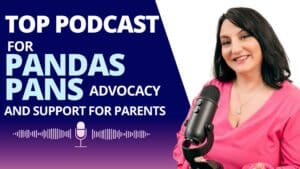Attention Deficit Hyperactivity Disorder (ADHD) is the bane of existence for many a parent. If you're a parent to a child or teen with ADHD, you're probably all too familiar with the ADHD symptoms: forgetfulness, lack of focus, impulsivity, and restlessness, to name a few.
How about other mental health and behavioral issues such as anxiety, autism, OCD, mood and behavioral problems, and PANS and PANDAS? Feel like you're on a rollercoaster that won't stop? Well, hold tight because you might be in for a pleasant surprise. Enter magnesium; our trusty underestimated essential mineral.
Magnesium and How it Can Improve Concentration and Focus
Magnesium is one of those unsung heroes of the human body. It's an essential mineral, playing many crucial roles, yet it often doesn't get the spotlight it deserves. This modest mineral is among the most abundant elements in the human body and is responsible for more than 300 enzymatic reactions.
It involves many essential processes, including energy production and muscle and nerve functions. It also regulates blood pressure and sugar levels, supporting a healthy immune system. If your body were an orchestra, magnesium would be the tireless conductor, ensuring each section comes in at the right time to create a harmonious symphony.
So, what does any of it have to do with ADHD symptoms? Well, recent studies have pointed to an interesting connection. One of magnesium's many roles involves supporting brain function and neurotransmitter activity (Kozielec & Starobrat-Hermelin, 1997). In the world of ADHD, neurotransmitters are essential. These chemical messengers of the brain help regulate behavior, attention, and improve concentration.
In a perfectly balanced brain, excitatory neurotransmitters, which increase brain activity, and inhibitory neurotransmitters, which decrease brain activity, work together to create an environment conducive to focus calm and improved thinking and concentration. But for those struggling with ADHD, this balance can often be out of whack, leading to hyperactivity, impulsivity, or inattention.
That means unfinished homework assignments and a lot of friction at home. I was recently working with a family of a teen with ADHD and learning issues, and they were all just so irritated with each other. Wyatt was your classic inattentive ADHD teen: smart but scattered. His concentration on non-preferred tasks was terrible.
Wyatt's concentration improved after adding Magnesium L-Threonate, Magnesium Glycinate, other supplements, and improved nutrition. His academic performance and grades dramatically improved when his parents added executive functioning strategies.
Here is where magnesium swoops in to save the day. This mighty mineral helps regulate neurotransmitter activity, preventing excitatory neurotransmitters' overactivity and promoting inhibitory neurotransmitters' function. It acts as a natural regulator, bringing the brain's overexcited concert to harmony.
Furthermore, magnesium supports the health of the blood-brain barrier, a gatekeeper mechanism that controls the passage of nutrients from the blood into the brain. Maintaining a robust blood-brain barrier is crucial for overall brain health and might play a role in ADHD.
So, parents dealing with ADHD, note that magnesium might be the undercover ally you've been searching for. And while it's not a magic cure, its role in overall brain health makes it a valuable player in the ADHD management team.
Benefits of Using Magnesium for Symptom Relief for Concentration and Processing Issues
Now let's talk about the benefits of using magnesium for those pesky ADHD symptoms and concentration difficulties. Just imagine for a moment – wouldn't it be wonderful if you found a way to help ease those roller-coaster-like mood swings, the bouncing off the walls, the “oops, I forgot to do my homework… again”?
Well, my fellow parents, this is where magnesium makes its grand entrance. It steps up on the stage with its trusty guitar and strums a tune that soothes the turbulent sea of ADHD. Research shows that a regular magnesium intake could significantly improve ADHD symptoms (Elbaz et al., 2017). So, what's the magic behind this mineral?
Remember the neurotransmitters we discussed earlier, the chemical messengers carrying all-important information in the brain? In the case of ADHD, these messengers sometimes get a bit overexcited or under-enthusiastic, causing a lack of balance and leading to symptoms such as hyperactivity, impulsivity, or inattention.
Magnesium steps in and keep the imbalance in check. It helps regulate the function of these neurotransmitters, ensuring they're all playing nicely and delivering the right messages at the right time. Think of it as an all-natural traffic conductor for your child's brain, working diligently to maintain a smooth and balanced cognitive flow.
Moreover, preliminary research has also pointed toward potential improvements in attention span, reduced restlessness, and better overall behavior with magnesium supplementation (Conners et al., 1972). So, while magnesium might not be the silver bullet to rid of all ADHD struggles, its benefits in managing symptoms can be a game-changer.
Best Forms of Magnesium for Concentration
There are several forms of magnesium, each with unique benefits and potential drawbacks. And when it comes to ADHD, some might have a slight edge over others. Here are some forms of magnesium that can aid with ADHD symptom relief.
1. Magnesium Oxide
Magnesium Oxide is a budget-friendly option as it’s commonly found and relatively cheap. But here's the catch: it's not bioavailable (Erine A. Kupetsky, D.O., 2019). In other words, the body struggles to absorb it, making it harder to get the job done.
2. Magnesium Citrate
This form of magnesium is highly bioavailable, meaning your body can absorb it quite easily (Adler-Neal, 2022). But it can be too lax. Magnesium citrate has a well-documented laxative effect, which might not fit your child's daily school routines best.
3. Magnesium Sulfate
Magnesium sulfate is also known as Epsom salt for those who don't know it yet. It's fantastic for a soothing soak to ease muscle cramps, but it can be great for ADHD symptoms as well (Doyle et al., 2014). However, its oral use is quite limited due to its similar laxative effect as Magnesium Citrate.
4. Magnesium L-Threonate
Think of Magnesium L-Threonate as the nerdy, brainy kid in school. It's specifically designed to cross the blood-brain barrier, making it potentially effective for improving cognitive function and brain health (Mousain-Bosc et al., 2018). It could be an excellent choice for ADHD management, but remember that it's one of the pricier forms of magnesium.
5. Magnesium Glycinate
Lastly, there's Magnesium Glycinate. This type is a combination of magnesium with an amino acid called glycine. The body quickly absorbs it and doesn't cause the same gastrointestinal issues that some of its counterparts can (Villagomez & Ramtekkar, 2014).
So, what's the best form of magnesium for kids with ADHD? If we chose a favorite magnesium, it would have to be Magnesium Glycinate. It has a good track record for supporting attention, mood, stress, and behavior.
How Much Magnesium Should You Take to Improve Concentration?
So, how much magnesium should you give your kiddo to manage ADHD symptoms such as concentration difficulties, being unfocused or inattentiveness? Unfortunately, there isn't a one-size-fits-all answer, as much as we'd love that simplicity.
To cover the basics, the recommended dietary allowance (RDA) for magnesium varies by age and sex. For children aged 4-8, it's about 130 mg per day; for kids 9-13, 240 mg per day; and for those in the 14-18 bracket, it's 410 mg for boys and 360 mg for girls. That's what the average kid needs, but what about our super kids with ADHD?

Studies have shown benefits for ADHD symptoms with 200-400 mg of magnesium daily (Ates et al., 2019). It's like adding a bit of extra seasoning to your favorite dish – just enough to enhance the flavor without overpowering it.
But remember, each child is unique, and the correct dose of magnesium can vary greatly. Factors like overall health, diet, and the severity of ADHD symptoms can all play a part.
But before rushing off to the supplement store, remember that it's always wise to consult with a healthcare professional first. They can help you determine the optimal amount of magnesium for your child's needs and monitor for potential side effects.
And here's another critical point – don't forget about dietary sources of magnesium. Foods like nuts, seeds, whole grains, and leafy green vegetables are all naturally high in magnesium. Sometimes, managing ADHD is not just about supplements but the entire diet and lifestyle. So here's to finding that perfect balance in magnesium dosage and managing ADHD symptoms!
Magnesium Deficiency and Concentration Issues
Let's now discuss magnesium deficiency and ADHD. Magnesium is an important master regulator which is involved in many enzymatic reactions. It's like a crucial cog in the body's machinery, and when it's missing, things can go haywire. And with ADHD, we're already dealing with a machine that can sometimes be out of sync.
What if we don't have enough magnesium? Well, it's not pretty. Magnesium deficiency symptoms can include a slew of unpleasantness: muscle cramps, irregular heartbeat, restless legs syndrome, fatigue, and mental health problems like mood disorders. Sound familiar? Some of these symptoms are strikingly similar to those of ADHD.

Several studies have shown that children with ADHD often have low magnesium levels (Baza et al., 2016). What's more, some research has suggested that magnesium supplementation could lead to a significant improvement in ADHD symptoms. It has led some experts to suggest that magnesium deficiency could, in part, contribute to ADHD symptoms.
And, as a fun fact, the connection between magnesium deficiency and ADHD might not just be about the direct effects on the brain. Magnesium also helps regulate blood sugar and supports a healthy immune system, both factors that can indirectly influence ADHD symptoms.
But before making conclusions, remember that while this evidence is intriguing, it's not definitive. Just as we wouldn't blame a single actor for a bad movie, we can't blame magnesium deficiency alone for ADHD. It's likely just one piece of a much larger, complex puzzle. As always, it's crucial to consider the big picture when managing ADHD symptoms.
And for those wondering if your child is deficient in magnesium or has clinical issues such as PANS/PANDAS, a simple blood test can help provide the answer. But always consult with a healthcare professional for advice tailored to your child's unique needs.
Choose the Best Magnesium Supplement for Concentration Issues
Choosing the best magnesium supplement for ADHD can feel daunting and a lot of guesswork. To get started, consider the different forms of magnesium. Each one has its unique characteristics, from bioavailability to potential side effects. For ADHD, Magnesium Glycinate and Magnesium L-Threonate often get the nod thanks to their high absorption rates and lesser likelihood of causing loose stools.
But before putting all your eggs in one magnesium basket, consider your child's needs and sensitivities. Like how one child might excel in math while another shines in art, what works best for your kid may not work for another. Some kids might tolerate one form of magnesium better than others.
Next up, consider the dosage. While there's no universally agreed-upon ‘ADHD dose' of magnesium, most studies have shown benefits with doses ranging from 200-400 mg daily. However, it's always wise to start on the lower end and gradually increase if needed.
Some magnesium supplements might also include additional ingredients, such as Vitamin D or B vitamins, which could also benefit ADHD. However, ensure it doesn't contain any additives or allergens to which your child might react.
Lastly, remember to seek professional advice. A healthcare professional can provide guidance tailored specifically to your child's needs. They can also help monitor progress and make any necessary adjustments over time.
Potential Side Effects of Magnesium Supplements
While we can say many beautiful things about magnesium, it's also important to mention its potential side effects.
First, let's get the most well-known side effect – diarrhea. Magnesium can play fast and loose with your digestive system, especially when consumed in high doses. Forms like Magnesium Citrate and Magnesium Oxide are particularly notorious for this.
Now, onto the lesser-known side effects. These can include stomach cramping, nausea, and in some cases, an irregular heartbeat. Magnesium can cause more severe issues in extremely high doses, such as low blood pressure, confusion, and even coma. But don't panic! These severe side effects are rare and typically only occur with excessive dosages.
It's worth noting that people with certain medical conditions like kidney problems should avoid magnesium supplementation unless advised by a healthcare professional. Their bodies might have difficulty excreting excess magnesium, leading to a potentially dangerous buildup.
Another potential side effect is the possible interaction with certain medications. For example, magnesium could decrease the absorption of some antibiotics and medicines for osteoporosis, potentially making them less effective.
Magnesium is generally safe for most people in the grand scheme of things. But as you introduce magnesium supplements into your child's routine, watch for any potential side effects. And, as always, consultation with a healthcare professional is paramount before starting any new supplement regimen. After all, it's about finding the best way to support your child's health, even if it means navigating a few side effects.
Combining Magnesium with Other Treatments for Concentration, Focus, and Processing Issues
Combining magnesium supplementation with other ADHD treatments can be an effective way to manage symptoms. Think of it like creating a dream team when each member brings unique strengths to the table, but they are even more powerful. Here are other natural solutions that can boost magnesium's potential:
1. Neurofeedback
Let's start with neurofeedback, a non-invasive therapy that teaches the brain to self-regulate. It's like giving your brain a fancy, high-tech mirror to see its activity and learn to control it better.
Neurofeedback has been shown to improve focus, impulse control, and mood in individuals with ADHD.
Now, throw magnesium into the mix. With its role in enhancing cognitive function and reducing stress, the two could create a dynamic duo for managing ADHD symptoms. We provide neurofeedback at our office in Ridgefield, CT, and remotely.
2. PEMF
In PEMF therapy, a PEMF device sends gentle electromagnetic waves that stimulate and encourage the body's natural healing processes. Combined with magnesium, which plays a vital role in cell function and neurotransmission, it might provide additional benefits for managing ADHD symptoms.
But remember, combining treatments should not be a DIY project. Always consult a healthcare professional who can guide you and monitor your progress. They can help ensure that treatments complement and do not conflict.
Ultimately, the journey through ADHD management can be challenging. Magnesium and other treatments like neurofeedback and PEMF therapy might provide a more holistic and practical approach. It's about finding the right team of treatments that works best for your child. And always remember, you're not alone in this fight, dear parents. Together, we're an unbeatable team!
Parent Action Steps
☐ Educate yourself about the role of magnesium in managing ADHD.
☐ Consult a healthcare professional before starting a magnesium supplement
☐ Take the Solution Matcher for science-backed solutions tailored to your child's needs
☐ Monitor your child's progress while taking magnesium supplements
☐ Consider combining treatments like neurofeedback and PEMF therapy
☐ Get on our waitlist for first dibs on our Neurotastic Magnesium supplement
☐ Ensure your child maintains a balanced diet that includes magnesium-rich foods
☐ Always stay positive and hopeful throughout your child's mental health journey
Citations
Adler-Neal, A. (2022, June 1). Vitamins and Minerals for Pediatric Attention-Deficit/Hyperactivity Disorder (ADHD). Www.naturalmedicinejournal.com. https://www.naturalmedicinejournal.com/journal/vitamins-and-minerals-for-pediatric-attention-deficit/hyperactivity-disorder-adhd
Ates, M., Kizildag, S., Yuksel, O., Hosgorler, F., Yuce, Z., Guvendi, G., Kandis, S., Karakilic, A., Koc, B., & Uysal, N. (2019). Dose-Dependent Absorption Profile of Different Magnesium Compounds. Biological Trace Element Research, 192(2), 244–251. https://doi.org/10.1007/s12011-019-01663-0
Baza, F. E., AlShahawi, H. A., Zahra, S., & AbdelHakim, R. A. (2016). Magnesium supplementation in children with attention deficit hyperactivity disorder. Egyptian Journal of Medical Human Genetics, 17(1), 63–70. https://www.ajol.info/index.php/ejhg/article/view/130933
Conners, C. K., Taylor, E., Meo, G., Kurtz, M. A., & Fournier, M. (1972). Magnesium pemoline and dextroamphetamine: A controlled study in children with minimal brain dysfunction. Psychopharmacologia, 26(4), 321–336. https://doi.org/10.1007/bf00421898
Doyle, L. W., Anderson, P. J., Haslam, R., Lee, K. J., & Crowther, C. (2014). School-age Outcomes of Very Preterm Infants After Antenatal Treatment With Magnesium Sulfate vs Placebo. JAMA, 312(11), 1105. https://doi.org/10.1001/jama.2014.11189
Elbaz, F., Zahra, S., & Hanafy, H. (2017). Magnesium, zinc and copper estimation in children with attention deficit hyperactivity disorder (ADHD). Egyptian Journal of Medical Human Genetics, 18(2), 153–163. https://www.ajol.info/index.php/ejhg/article/view/156425
Erine A. Kupetsky, D.O. (2019). Magnesium. CRC Press.Kozielec, T., & Starobrat-Hermelin, B. (1997). Assessment of magnesium levels in children with attention deficit hyperactivity disorder (ADHD). Magnesium Research, 10(2), 143–148. https://europepmc.org/article/med/9368235
Mousain-Bosc, M., Siatka, C., & Bali, J. (2018, June 20). Magnesium, Hyperactivity and Autism in Children. Europepmc.org. https://europepmc.org/article/NBK/nbk507249
Villagomez, A., & Ramtekkar, U. (2014). Iron, Magnesium, Vitamin D, and Zinc Deficiencies in Children Presenting with Symptoms of Attention-Deficit/Hyperactivity Disorder. Children, 1(3), 261–279. https://doi.org/10.3390/children1030261
Always remember… “Calm Brain, Happy Family™”
Are you looking for SOLUTIONS for your struggling child or teen?
Dr. Roseann and her team are all about solutions, so you are in the right place!
There are 3 ways to work with Dr. Roseann:
You can get her books for parents and professionals, including: It’s Gonna Be OK™: Proven Ways to Improve Your Child’s Mental Health, Teletherapy Toolkit™ and Brain Under Attack: A Resource For Parents and Caregivers of Children With PANS, PANDAS, and Autoimmune Encephalopathy.
If you are a business or organization that needs proactive guidance to support employee mental health or an organization looking for a brand representative, check out Dr. Roseann’s media page and professional speaking page to see how we can work together.
Dr. Roseann is a Children’s Mental Health Expert and Therapist who has been featured in/on hundreds of media outlets including, CBS, NBC, FOX News, PIX11 NYC, The New York Times, The Washington Post,, Business Insider, USA Today, CNET, Marth Stewart, and PARENTS. FORBES called her, “A thought leader in children’s mental health.”

She is the founder and director of The Global Institute of Children’s Mental Health and Dr. Roseann Capanna-Hodge. Dr. Roseann is a Board Certified Neurofeedback (BCN) Practitioner, a Board Member of the Northeast Region Biofeedback Society (NRBS), Certified Integrative Medicine Mental Health Provider (CMHIMP) and an Amen Clinic Certified Brain Health Coach. She is also a member of The International Lyme Disease and Associated Disease Society (ILADS), The American Psychological Association (APA), Anxiety and Depression Association of America (ADAA) National Association of School Psychologists (NASP), International OCD Foundation (IOCDF) International Society for Neurofeedback and Research (ISNR) and The Association of Applied Psychophysiology and Biofeedback (AAPB).
© Roseann-Capanna-Hodge, LLC 2023
Disclaimer: This article is not intended to give health advice and it is recommended to consult with a physician before beginning any new wellness regime. *The effectiveness of diagnosis and treatment vary by patient and condition. Dr. Roseann Capanna-Hodge, LLC does not guarantee certain results.













